This Tauranga duo built their sustainable dishcloth business on friendship
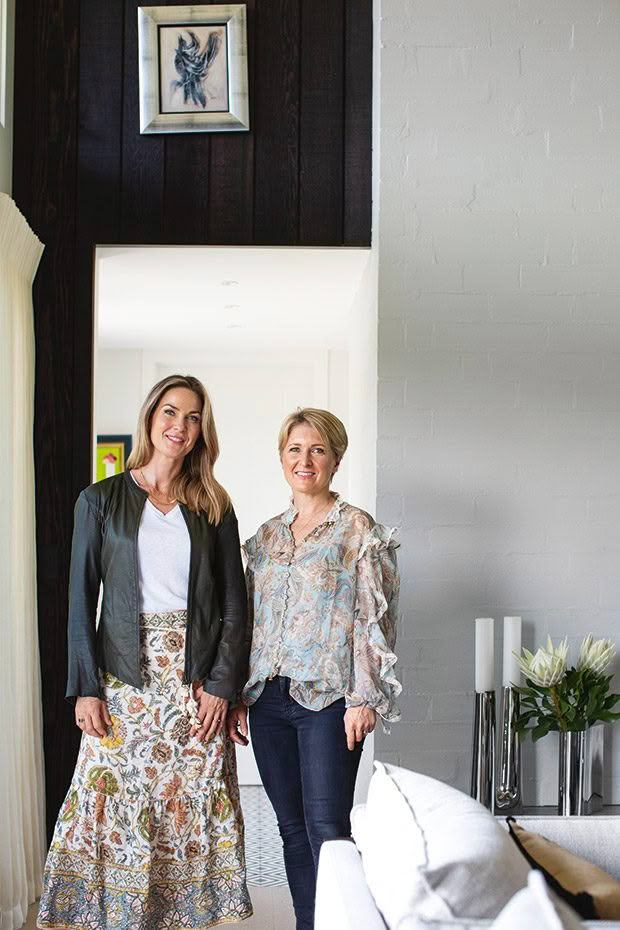
Stine (left) and Kristy Hunter were friends long before they became business partners.
Combining friendship with work can be risky but two go-getting Tauranga women, each with a desire to create a more sustainable world, have chosen to join forces.
Words: Heather Kidd Photos: Tessa Chrisp
Gone are the days when the school drop-off for Stine Smith and Kristy Hunter was about bundling the kids from the car and waving them through the school gate. While that early morning routine still takes place, these days it’s followed by a quick catch-up. The two mums call it a “huddle” — and it is strictly business.
“We have to begin with a good-news story,” says Stine (pronounced Steena). “We want to start each day on a positive note.”
“And we go through our top three on the to-do list – what we’re doing and a few things we need to get back to each other about,” adds Kristy. Meeting over, they jump back into their respective vehicles and go their separate ways.
Building a business from scratch can be consuming, particularly when done in combination with managing a home and family. But two years on, the duo’s business, Good Change, is flourishing and the friendship is intact. “We’re both quite nimble, we don’t sweat the small stuff, and we just get on with it,” says Kristy. “We have a good laugh along the way too.”
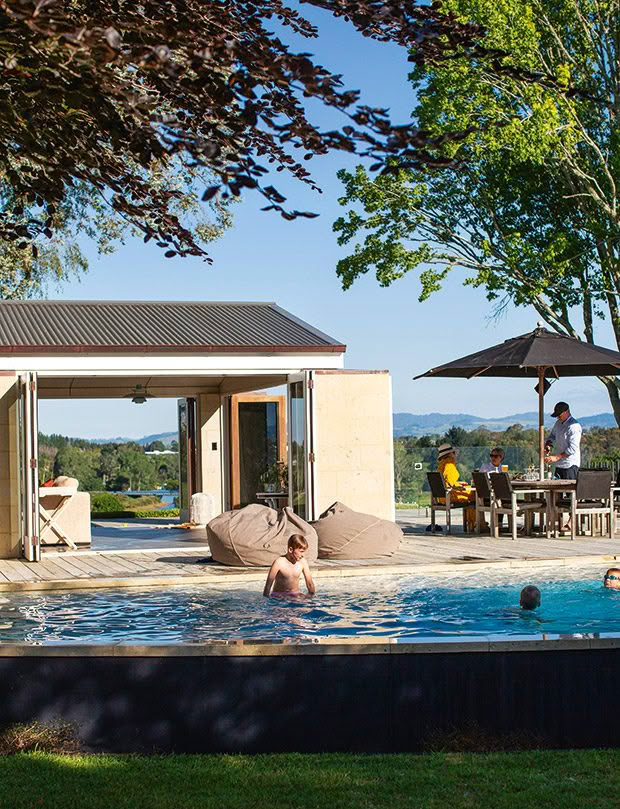
“We’re low-maintenance people,” agrees Stine. “I can see how partnerships such as ours can go wrong, but we make sure we have fun. Sometimes we laugh because our business is about something incredibly basic — a dishcloth.”
Careerwise, the humble dishcloth should be well out of Stine’s comfort zone. A change-management specialist, she is originally from Denmark. Her journey to New Zealand was via a circuitous route — university in the United States, jobs in Copenhagen and London and a transfer to a Middle East office on a three-year contract.
She was in Dubai when she met the man she would marry. “One of our customers was sponsoring the rugby sevens tournament in Dubai and was handing out free tickets. I had a Danish friend visiting, and we decided to go; it was a chance to check out some fit men.”
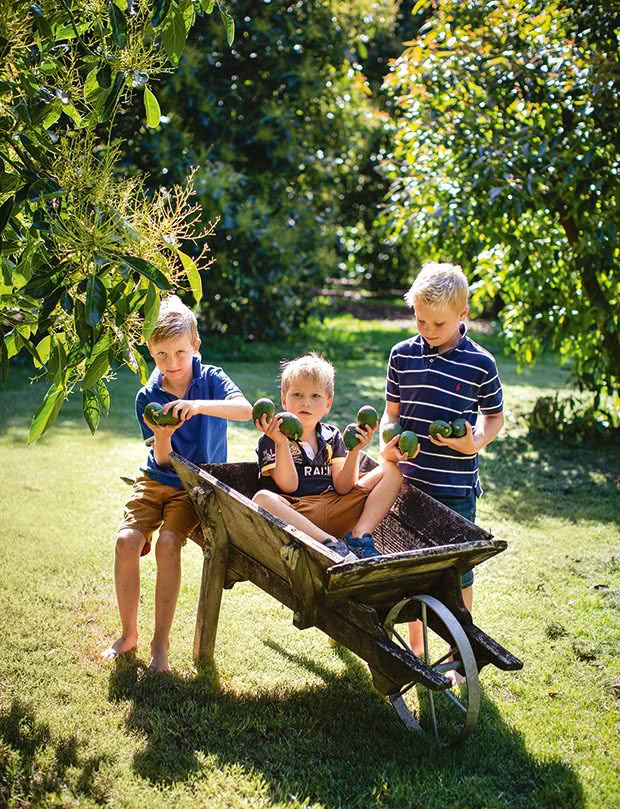
The Smith family’s three-hectare avocado orchard is a playground for (from left) Frank, Sebastian and Augustus.
However, it was a fellow spectator rather than a rugby player who caught her eye as they were leaving the stadium. “I bumped into this guy, he smiled at me, and I was like, ‘You’re the one, I want to have your children.’ We got talking. I thought he had a cute Australian accent, which I quickly found out was Kiwi.”
Stine invited the man, Jason Smith, to join her and her friend at a bar. Although the attraction between the couple was immediate, circumstances dictated that their relationship be long-distance. Tauranga-based Jason traveled extensively for his work, enabling him to meet Stine in Dubai every two to three months.
When Stine’s contract in the Middle East ended, she had the option of returning to London or moving to the other side of the world. She chose New Zealand. Soon, she accepted a role with Fonterra, splitting her time between Auckland and Tauranga.
However, when she got pregnant with the couple’s first child, the commute quickly became impractical, so she quit her job to move to the Bay of Plenty. That was nine years ago. Eldest son Frank (8) was born two weeks after she moved to Tauranga. He now has two brothers, Augustus (6) and Sebastian (4).
- The family often toast marshmallows over the firepit in front of the house.
- The openness of the house works well for the young family. The renovated building was originally meant to become a guesthouse for family and friends, particularly those from Denmark who come over for extended stays, but thanks to the pandemic, plans for a new build have been put on hold.
Kristy, also a mother of three — Polly (11), George (9) and Meg (7) — was introduced to Stine at a morning tea hosted by one of Jason’s neighbours the week Stine arrived in Tauranga, and the two quickly became friends.
They had plenty in common; both were university-educated, widely traveled, had lived in foreign countries, and enjoyed fast-paced careers. Kristy’s background was in sales and marketing and recruitment, and she combined being a stay-at-home mum with organizing fundraising events.
As their friendship deepened, they mulled over what their futures might hold workwise. It turned out they were thinking similarly, wanting to create something that would go some way to making the world a cleaner, greener place in which their children would grow up.
“Once you have children, you become more aware of the world you’re passing on to them,” says Stine. “Also, we’re at a stage in our lives where we don’t want to work just to plough back money into ourselves; we want to work for a higher purpose.” [Some of Good Change’s earnings go towards providing clean water for families in Cambodia.]
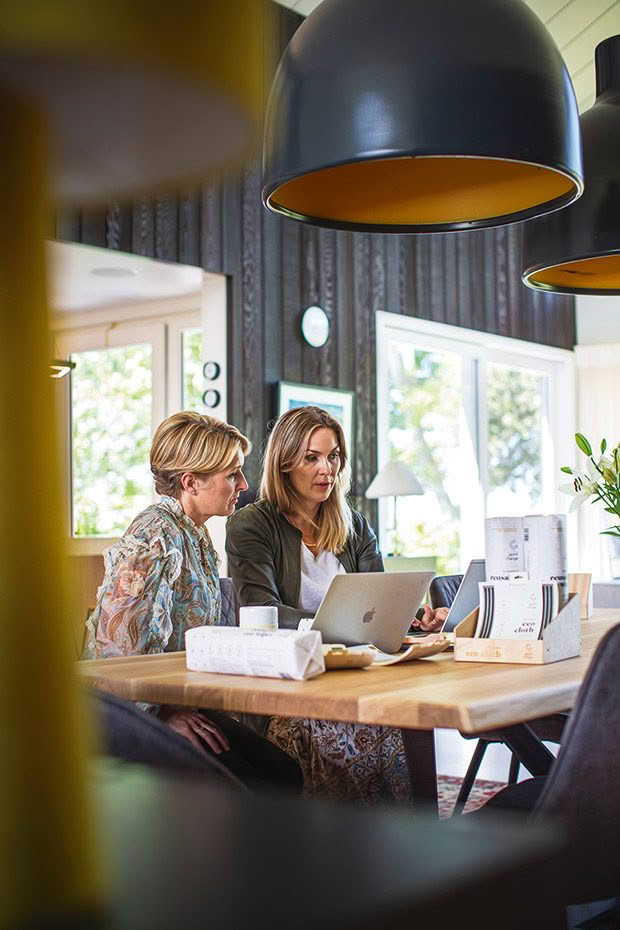
Yet the idea of teaming up didn’t happen immediately. Kristy began developing an anti-bacterial cleaning product and, in 2018, having made good progress with her concept, she and her husband Mark took their children to France for an extended break.
Stine meanwhile was researching cleaning products. When she came across a cloth made of cotton mixed with wood pulp that could be made into sustainable dishcloths, she knew it fitted her brief. She also knew that she wanted Kristy on board.
“As soon as I got home from France, Stine asked me to meet with her. After I’d done the school drop-off the first day back, I bolted across to her place,” Kristy recalls. “That was when she presented me with the idea of producing sustainable dishcloths.”
- The house is a blend of New Zealand and Danish interior design. Its spacious hub was once a former two-storey packhouse. The floors are whitewashed oak, a nod to Jason’s timber business. The industrial lamps, a gift from friends in Denmark, originally hung in a sugar factory in Copenhagen.
Like Stine, Kristy felt the concept was a winner, and she was happy to put aside her project and work with her friend to make Good Change happen.
That was in October 2018, and just nine months later their cleaning cloths hit store shelves in Wellington. The response was overwhelmingly positive, and the products are now sold nationwide. (Good Change also produces bamboo wipes.)
The appeal of the Good Change range is two-fold — sustainability and eye-catching design. The cloths have a simple European elegance, their muted colour palette of grey, green, mustard, and black and white is produced from plant-based dyes.
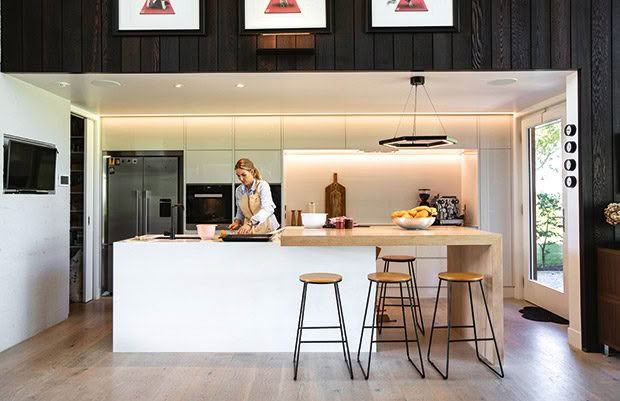
The design of the kitchen was kept simple because of its openness to the main living area. The oak benchtop ties in with the bookshelves and flooring in the living room.
“Our thinking is that everything else in a kitchen or bathroom looks quite tidy and well designed so we might as well put good designs on our dishcloth,” says Stine. “They last six to nine months and can become an extension of your interior brand. You can leave them on display because they look good.”
Washing is easy: toss the cloth in the dishwasher or washing machine and then at the end of its life, dig it into the garden where it will break down in two to three months.
While Good Change is about a product, for Stine and Kristy it’s also about promoting sustainability and encouraging people to think about the products they purchase, the potential harm they might do, and how making changes will help make the environment cleaner and greener.
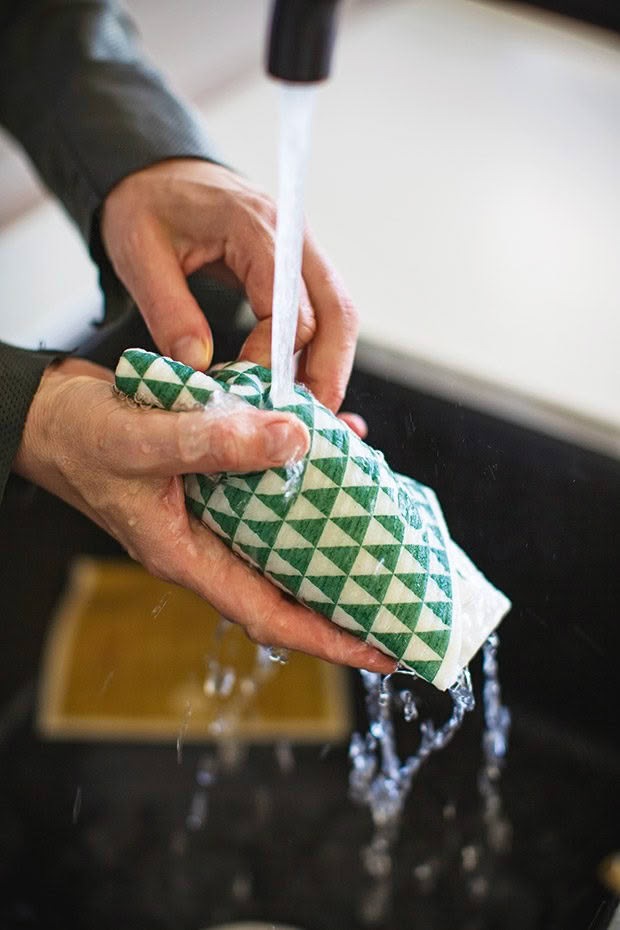
Encouraged by the positive response to their reusable eco-cloths and bamboo towels, Stine and Kristy plan to launch new products in the coming months. Although growing their start-up is serious business, the duo is determined to enjoy the journey.
“We try to communicate to our customers that we want them to make changes,” said Kristy. “It’s not about massive changes; it’s about small integral steps we can make in our day-to-day living. For example, I haven’t bought Gladwrap for 18 months or paper towels in almost a year. I don’t use plastic bin liners either; I just put stuff straight in the bin.”
Stine agrees: “What I saw from my change management background is that if you’re asking people to make changes, break it up into little pieces and they will be more likely to do so. If you change your dishcloth, that’s one step. “And while it’s just a cleaning cloth it’s also so much more. It’s a mind shift for many of the people who buy it — they want to make changes for the better.”
Others agree. Good Change won two gold medals, a bronze and two editor’s choice awards in the 2020 Australian Non-Toxic Awards. It was also named as the recipient of the Social Responsibility Award (Home category).
- The large herb garden was created as a feature, its formal lines delineated by box hedging and pebble pathways. Jason built the raised beds. Stine’s favourite herbs are parsley, coriander and tarragon.
- The property was a deer farm 40 years ago, its then-owners responsible for the planting the now-mature trees.
STARTING A BUSINESS: STINE & KRISTY’S BIGGEST LESSONS
Every little brand emerges from a foundation of hard work. We have learned much from starting and growing our business. Being time-efficient is critical as we juggle running our company with bringing up young families.
Action is everything and 80 per cent done is better than waiting for perfection. Also, systems and processes are essential for efficiency, and we try to automate or outsource what we can. We make a conscious effort to grab every opportunity that comes our way as it could lead to the next big thing.
Embrace being a generalist. During a typical day’s work, we work across multiple areas such as accounting, e-commerce and product development. We recommend that specialists partner up with someone who can complement them in other areas.
Don’t sweat the small stuff. As business owners, we need to solve problems every day, and we can’t afford to get hung up on the little things; it’s impossible to move forward.
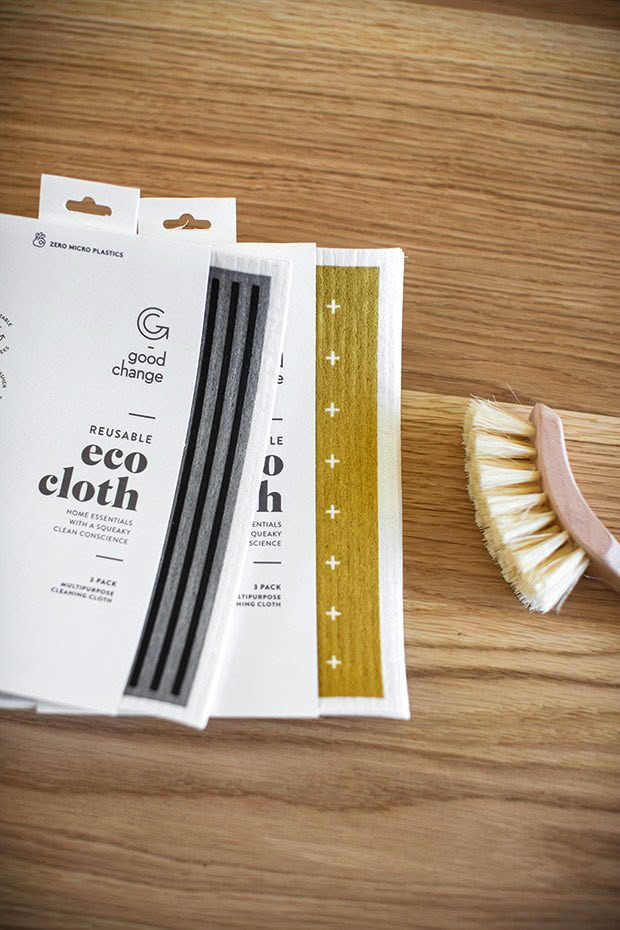
Having a business can become all-consuming. It’s easy to lose contact with friends, so try to book time in for them.
Have a purpose. The market is changing, and businesses need to have a higher purpose other than adding just another product to the shelves. Good Change is focused on making a positive impact, and all decisions go through the filter of, “What good will this drive?”
Have fun. Running a business will have ups and downs. But try and have fun — it’s a lot easier. goodchangestore.com
11 EASY WAYS TO BE GREEN
1. Avoid bin liners. Put rubbish straight into the bin, scrubbing it weekly to keep it hygienic.
2. Use beeswax wraps to cover food in the fridge and for sandwiches or lunches. Try to make the switch from unrecyclable soft plastic.
3. Cut down on single-use paper towels. They are convenient but not good for the environment. Instead, use a dishcloth for spills or try to use a thinner eco-wipe that can be washed and reused.
4. Shop fresh. Try to walk the periphery of the supermarket only. This is where the fresh food is, which means less plastic packaging and packaged food.
5. Use a coffee mug instead of paper cups.
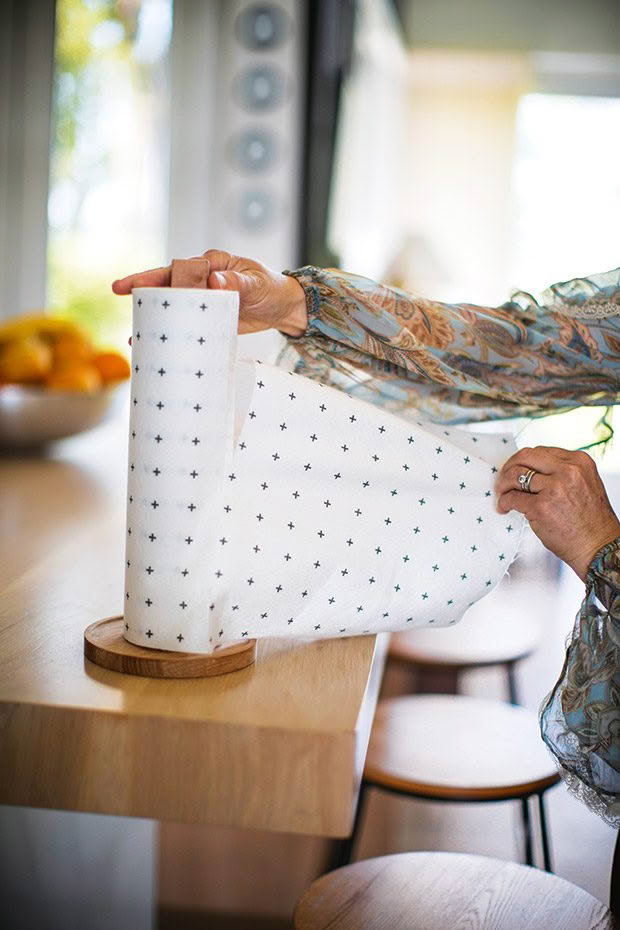
6. Switch lightbulbs to energy efficient types.
7. Wash laundry in cold water instead of hot.
8. Commit to always carrying a reusable water bottle and don’t use throwaway single-use plastic bottles.
9. Keep a bucket under the sink for all scraps. These can be put into a proper composting unit or dug back into the garden. Watch as the worms arrive and the soil becomes healthy and fertile.
10. Use a few drops of essential oil in floor-cleaning water as a natural anti-bacterial agent.
11. Propagate plants. Take a cutting from a woody part of the plant and pop it in the ground. A whole garden can be created from cuttings. There is nothing more satisfying than growing things.
Love this story? Subscribe now!
 This article first appeared in NZ Life & Leisure Magazine.
This article first appeared in NZ Life & Leisure Magazine.






